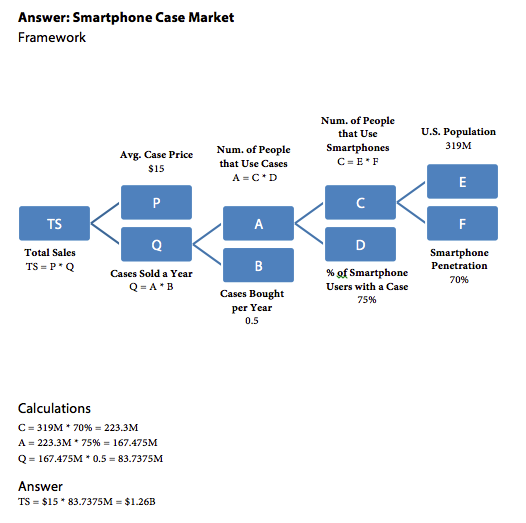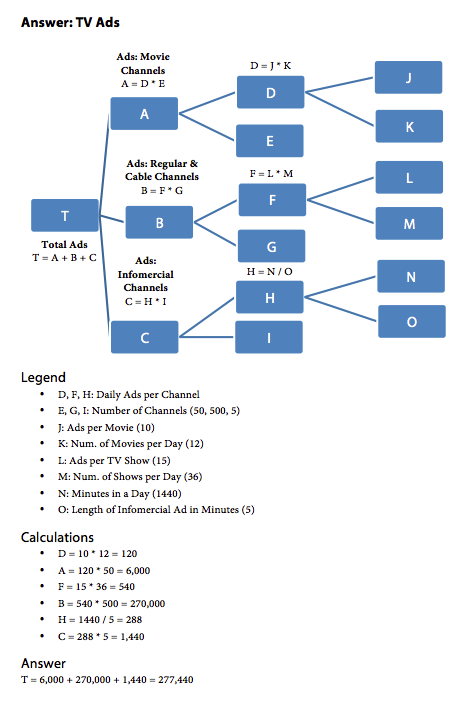Market Sizing & Estimation Interview Questions
October 5th, 2016 by lewis

Source: Interview Math Book, Market Sizing Example
What are estimation questions?
Estimation questions test your ability to approximate a value. Here are some examples one might encounter in an interview:
- What is the market size of disposable diapers in China?
- Estimate annual sales for Starbucks’ retail stores in the United States.
- Estimate summer sales of Disneyland tickets in the United States.
Some candidates refer to estimation questions by its catchier portmanteau, guesstimates.
What are the different types of estimation questions?
There are different types of estimation questions; market sizing and revenue estimations are two of the most common.
What is a market sizing question?
In the phrase “market sizing questions,” “market size” refers to a total addressable market. That is, what would be a company’s revenue if it had 100% market share of a category? For example, an interviewer may ask you the following market sizing estimation question: “What is the market size of disposable diapers in China?”
Market size is usually stated in terms of revenue, but some interviewers may define it in terms of units sold. To minimize miscommunication, clarify with the interviewer.
Examples of market sizing questions include:
- What is the market size of women’s rain boots in Seattle?
- What is the market size of toothbrushes in the United States?
- What is the market size of real Christmas trees in the United States?
What is a revenue estimation question?
For revenue estimations, a candidate is expected to calculate company, product, or service revenues.
Examples of revenue estimation questions include:
- Estimate annual sales for Subway restaurants in the United States.
- Estimate annual sales of Target’s brick-and-mortar stores in the United States.
- Estimate annual sales of Netflix online streaming subscriptions in the United States.
Why do interviewers ask these questions?
Interviewers use estimation questions to evaluate a candidate’s:
- Problem solving skills. Can a candidate take an unfamiliar problem and develop a plan to solve it confidently?
- Communication skills. Can the candidate clearly communicate his or her action plan to the interviewer? Is it easy-to-follow? Or does the interviewer have to ask an excessive number of clarifying questions to unravel the candidate’s thoughts?
- Analytical dexterity. Can the candidate confidently calculate numbers in real-time? Or is the candidate hesitant? Does the candidate rely on using a calculator or computer to crunch numbers? Or does the candidate needlessly round up numbers to oversimplify calculations?
- Judgment. Does the candidate choose reasonable assumptions, backed by logical thinking? Or is the candidate too casual and sloppy?
Some may deride estimation interview questions as not having real-world applicability. However, estimation is a skill that helps professionals do their jobs. For example, if you are store keeper, your responsibilities include figuring out how much inventory to order. If you are an equity analyst, you may estimate a firm’s future enterprise value.
Estimation can also help with decision-making. Here is an example: let us say we are evaluating a business decision; we want to open a new McDonald’s in our city. To breakeven, we need to generate $500,000 in sales. There are several McDonalds’ stores already, which means we are not going to get many customers.
Given this constraint, let us say for the sake of argument, we deduced that each visitor needs to spend $150 to breakeven. Yikes! We just identified a flaw in the investment thesis. A typical McDonald’s customer spends $8; getting customers to spend $150 per visit is a big stretch. To summarize, the estimation example showed how our calculations identified a faulty sales per visitor assumption.
What are they looking for in an ideal response?
Here is what interviewers would consider as a top notch answer to an estimation question:
- Logical plan of action that is easily understood. Interviewers want to feel confident (and you should feel confident too) that you have a clear plan when solving an ambiguous estimation problem. Good candidates communicate a plan that not only gets them to the right answer but also easy for the listener to follow along.
- Communication skills. Interviewers do not just want to hear the answer. They also want to hear the thinking too. So candidates who silently solve a problem on their own and resurface in five minutes will not do well. Communicating one’s thoughts is critical to sharing knowledge and gaining buy-in to one’s approach.
- Choose reasonable assumptions with clear explanations. Interviewers would like you to use reasonable assumptions. Silly assumptions such as “there are 100 billion people in the world” show that a candidate is out-of-touch, which minimizes the individual’s credibility with clients, executives, and co-workers. Furthermore, it would be polite to explain why you chose a particular assumption.
- Accuracy. Some estimations are the basis for decision-making. Thus, accuracy is important. But clearly, accuracy will improve if there is more time to work on it. Given an interview scenario, most interviewers would like candidates to spend at most 15 minutes and as little as 5 minutes on an estimation question. Candidates must tradeoff between accuracy and speed – and get the most accurate response possible in a 10 minute timeframe.
Do you have an example of a market sizing question?
We’ve included two examples of market sizing questions and their solutions:
- What is the market size for smartphone cases in the United States?
- How many TV ads are shown in the US each day?
You’ll find sample answers for each question at the top and bottom of the article, respectively.
How do I find more market sizing examples?
You can find more market sizing examples from Lewis C. Lin‘s book, Interview Math.

Source: Interview Math Book, Market Sizing Example